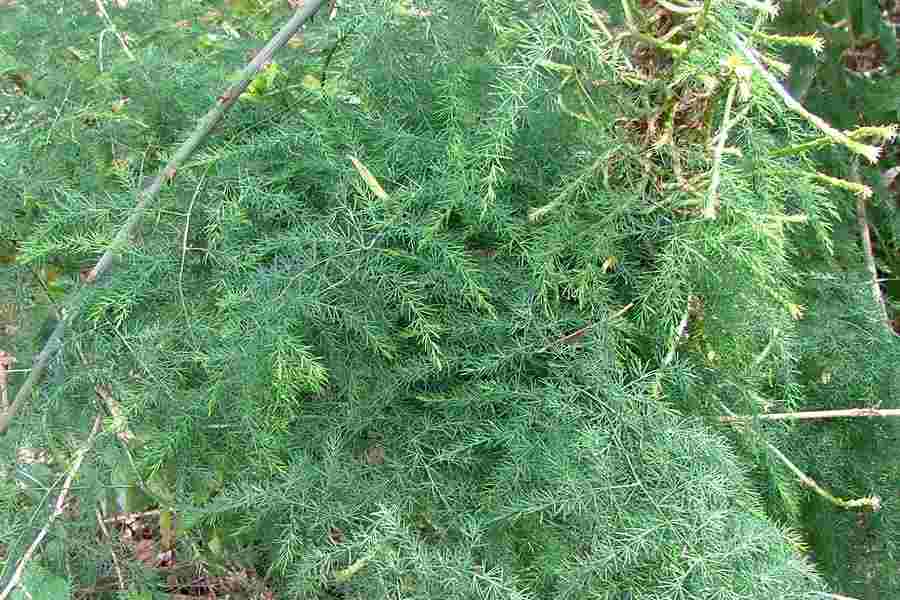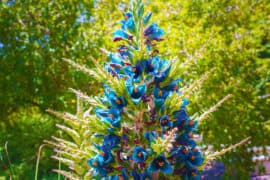African asparagus
(Asparagus africanus)

Description
Asparagus africanus, also known as African asparagus, is a perennial plant that belongs to the Asparagaceae family. It is native to Africa and is widely distributed across the continent. The plant has been used for its medicinal properties for centuries and is also a popular ornamental plant in gardens around the world. In this article, we will explore the various aspects of Asparagus africanus, including its morphology, distribution, cultivation, and medicinal properties. Morphology Asparagus africanus is a herbaceous plant that grows up to 1.5 meters in height. The plant has a rhizomatous root system and a woody stem that is covered in thorny branches. The leaves of the plant are long and slender, measuring around 3-5 cm in length and 1-2 mm in width. They are arranged in clusters of 2-5 on the stem and are often reduced to small scales in the thorny parts of the branches. The flowers of Asparagus africanus are small and white, measuring around 5 mm in diameter. They are arranged in clusters of 2-5 on the stem and bloom from August to December. The fruit of the plant is a berry that is initially green and turns red when ripe. The berry contains black seeds that are around 3 mm in diameter. Distribution Asparagus africanus is native to Africa and is found in a wide range of habitats, including grasslands, savannas, and woodlands. The plant is widely distributed across the continent, from Senegal in the west to Ethiopia in the east and down to South Africa. It is also found in Madagascar and the Comoros Islands. The plant has been introduced to other parts of the world, including the Americas, Asia, and Europe, where it is grown as an ornamental plant. Cultivation Asparagus africanus is an easy-to-grow plant that is well suited to a range of growing conditions. Here are some tips for cultivating Asparagus africanus: Soil: Asparagus africanus prefers well-drained soil that is rich in organic matter. The soil should be slightly acidic with a pH of around 5.5-6.5. Sunlight: Asparagus africanus can grow in full sun or partial shade. However, it prefers some protection from the hot afternoon sun. Water: Asparagus africanus is tolerant of drought and can survive on minimal water. However, it will grow best with regular watering during the growing season. Temperature: Asparagus africanus is a warm-weather plant and prefers temperatures between 20-30°C (68-86°F). It is not frost-tolerant and should be protected from freezing temperatures. Propagation: Asparagus africanus can be propagated by dividing the rhizomes or by sowing seeds. The best time to divide the rhizomes is in the early spring when new growth is beginning to emerge. Seeds should be sown in the spring or summer. Fertilizer: Asparagus africanus will benefit from regular fertilization with a balanced fertilizer. Apply the fertilizer every 4-6 weeks during the growing season. Pruning: Asparagus africanus can be pruned to control its size and shape. Prune the plant in the late winter or early spring before new growth begins. Pests and Diseases: Asparagus africanus is generally resistant to pests and diseases. However, it can be susceptible to root rot if the soil is too wet. Harvesting: The leaves and stems of Asparagus africanus can be harvested for their medicinal properties. Harvest the leaves and stems in the morning when the plant is still cool and dry. Dry the harvested plant material in a cool, dark, and well-ventilated place. Overall, Asparagus africanus is a relatively low-maintenance plant that is easy to grow in a variety of conditions. With proper care, it can thrive in a home garden or as a medicinal herb. Medicinal properties Asparagus africanus has a long history of traditional medicinal use in various parts of Africa. The plant is believed to have a range of therapeutic effects due to its chemical constituents, which include saponins, flavonoids, and phenolic compounds. Here are some of the medicinal properties that are associated with Asparagus africanus: Anti-inflammatory: Asparagus africanus has been traditionally used to treat inflammation and pain. Research has shown that the plant contains compounds that have anti-inflammatory effects, which may help reduce swelling, redness, and pain. Diuretic: Asparagus africanus has diuretic properties, which means it can increase urine production and help remove excess fluids and toxins from the body. This makes it useful for treating conditions such as edema, urinary tract infections, and kidney stones. Antioxidant: Asparagus africanus contains antioxidants, which are substances that can protect cells from damage caused by free radicals. Free radicals are unstable molecules that can cause oxidative stress, leading to cell damage and inflammation. Antioxidants can neutralize free radicals and help prevent damage to cells. Immunomodulatory: Asparagus africanus has been shown to have immunomodulatory effects, which means it can help regulate the immune system. This may be useful for treating autoimmune disorders and other conditions that involve an overactive immune system. Antimicrobial: Asparagus africanus has antimicrobial properties, which means it can help fight off bacterial, fungal, and viral infections. This may make it useful for treating conditions such as respiratory infections, skin infections, and gastrointestinal infections. Anti-cancer: Some studies have suggested that Asparagus africanus may have anti-cancer properties. The plant contains compounds that can help inhibit the growth of cancer cells and prevent them from spreading. Overall, Asparagus africanus has a range of potential medicinal properties that make it a valuable plant for traditional medicine and pharmaceutical research. However, more research is needed to fully understand its therapeutic effects and to determine safe and effective dosages. Conservation Status According to the International Union for Conservation of Nature (IUCN) Red List, the conservation status of Asparagus africanus is currently listed as "Least Concern". This means that the species is not currently at risk of extinction and is considered to be abundant and widespread throughout its range. However, like many wild plant species, Asparagus africanus may be at risk from habitat destruction, overexploitation, and other threats in the future. Therefore, it is important to monitor the species and its habitat to ensure that its population remains stable in the long term. Conclusion Asparagus africanus is a versatile plant that is well suited to a range of growing conditions. It is a popular ornamental plant in gardens around the world and is also used for its medicinal properties. The plant has a range of therapeutic effects, including anti-inflammatory, diuretic, and antioxidant properties, and is used to treat a range of ailments. Asparagus africanus is a valuable addition to any garden or medicinal herb collection and is well worth cultivating.
Taxonomic tree:







